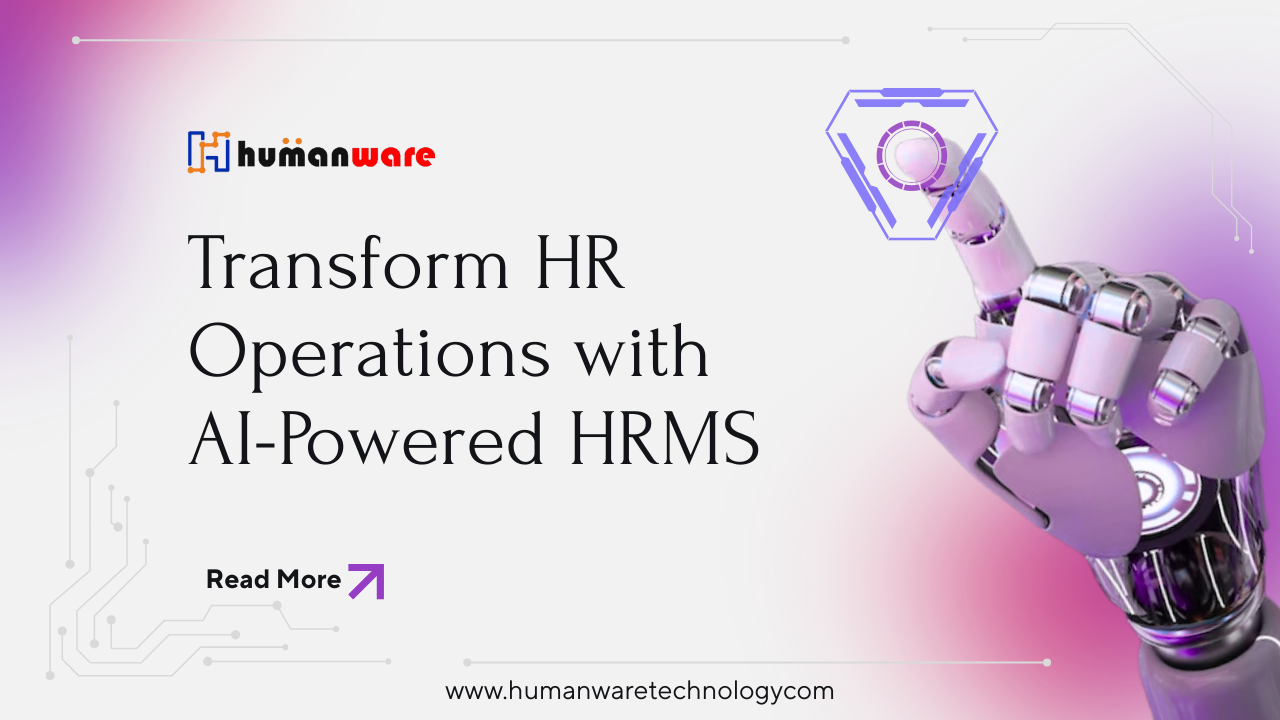
What is AI-Powered HRMS and Why Your Business Needs It?
Traditional HR systems struggle to keep up with business growth, hybrid work models, and employee expectations. Manual processes, repetitive tasks, and a lack of real-time information often slow down HR teams and reduce organizational effectiveness. That's where AI-powered human resource management systems (HRMS) come into action. As they offer a smarter, faster, and more data-driven workforce management solution. By integrating AI with key HR functions like recruiting, payroll, attendance, and performance management, these advanced systems help companies of all sizes streamline operations and make more strategic HR decisions. Implementing an AI-powered HRMS can revolutionize your HR department.
What is an AI-Powered HRMS?
An artificial intelligence (AI)-powered human resource management system (HRMS) is an advanced software platform that integrates key HR functions such as payroll, attendance, recruitment, onboarding, and performance management using artificial intelligence (AI) technologies. Unlike traditional HR software, which relies on manual data entry and static rules, AI-powered HRMS platforms leverage machine learning, predictive analytics, and automation to increase accuracy, efficiency, and streamline decision-making.
These systems not only automate repetitive tasks but also analyze data, suggest actions, and continuously learn user behavior. The result is a more efficient, intelligent, and personalized HR experience for both employees and HR teams.
Key Features of AI-Enabled HRMS
1. Smart Recruitment AutomationArtificial intelligence algorithms analyze thousands of resumes in seconds, matching candidates to job descriptions, and even classifying them based on skills and experience. This reduces manual screening time and improves the quality of recruitment by minimizing human interference.
2. Predictive AnalyticsArtificial intelligence analyzes historical employee data for predictive analysis such as turnover, future hiring needs, and potential performance issues. This information allows HR managers to make proactive decisions to improve retention and workforce planning.
3. AI-Powered ChatbotsBuilt-in chatbots can answer common employee questions, such as vacation balances, vacation schedules, and payroll status. Available 24/7, these chatbots reduce the burden on HR and provide employees with immediate assistance.
4. Personalized Onboarding ExperiencesArtificial intelligence personalizes onboarding processes based on workload, departments, and employee profiles. From document uploads to training schedules, the process becomes smoother and more engaging for new employees.
5. Real-Time Performance ManagementAI tools continuously monitor performance data, feedback, and productivity metrics, helping managers and employees track progress toward goals. This enables timely recognition, improvement planning, and informed evaluation.
6. Intelligent Leave and Attendance ManagementUsing artificial intelligence, the system can detect frequency patterns, flag anomalies, and suggest scheduling optimizations. It can also automate approvals based on company policy and workload forecasts.
7. Compliance and Policy AutomationArtificial intelligence-based systems adapt to evolving labor regulations. They help ensure payroll compliance, automate legal processes, and reduce the risk of human error in HR departments.
Why Businesses Need AI-Powered HRMS?
An AI-powered HRMS offers exactly that by automating routine tasks like recruiting, payroll, and attendance management, saving time and increasing efficiency. It provides real-time predictive analytics, enabling HR teams to make informed decisions about hiring, retention, and workforce planning. AI-powered self-service features and chatbots improve the employee experience by providing fast and personalized support. Furthermore, these systems are cloud-based, making them ideal for managing remote or hybrid teams. They also help ensure compliance with labor laws by minimizing errors in payroll and reporting.
As your business grows, an AI-powered HRMS system easily adapts to changing HR needs without requiring extensive manual intervention. In short, it transforms your HR department from a support function into a strategic driver of success.
Conclusion
Implementing an AI-powered HRMS system is no longer a wish to have, but a necessity. From simplifying recruitment and streamlining decision-making to improving employee experience and ensuring regulatory compliance, AI is transforming HR at every level. Whether you're a growing startup or a mature enterprise, integrating AI into your HR processes can help you stay competitive, agile, and ready for the future. By automating routine tasks and providing in-depth employee insights, an AI-powered HRMS system not only saves time and resources but also allows your HR team to focus on what matters most: people, results, and productivity. If you want to modernize your HR operations and fully utilize your employees' potential, now is the perfect time to explore AI-powered HR solutions.